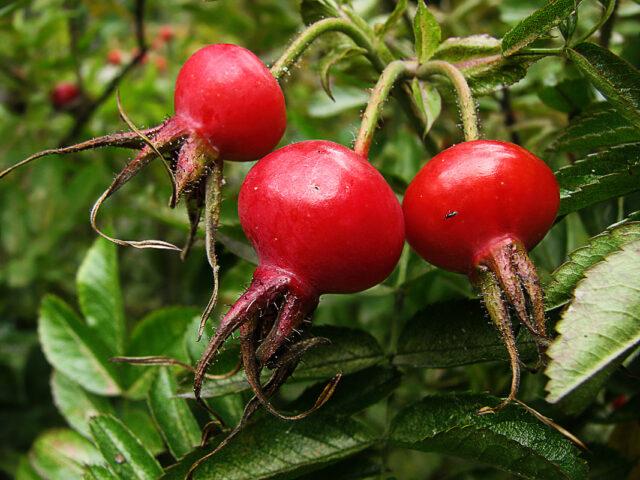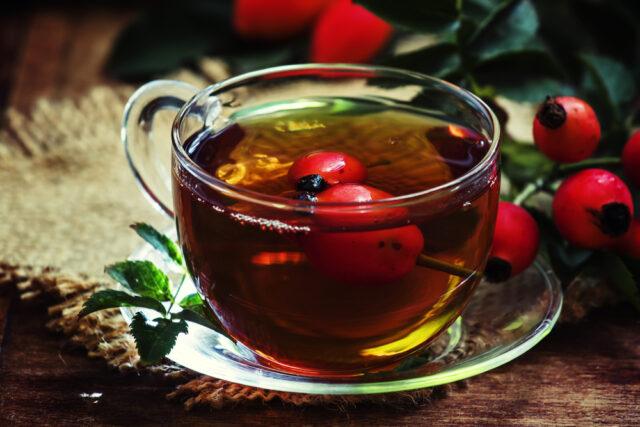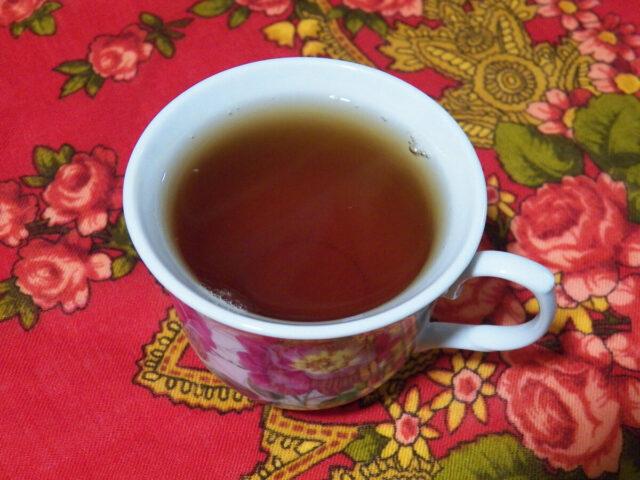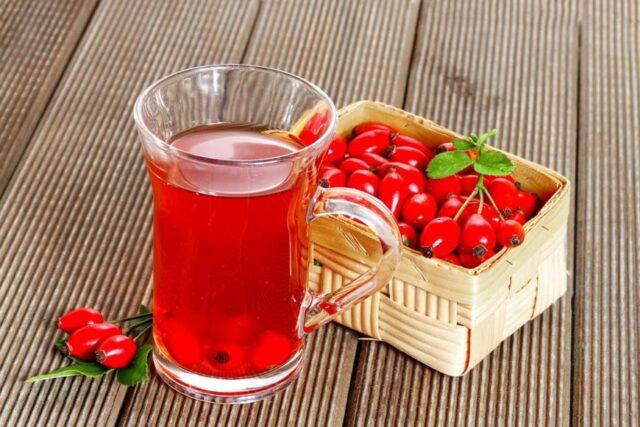Content
The fact that rose hips are extremely rich in vitamin C is known to many. But not everyone knows that its concentration in these fruits is 50 times higher than in lemons. Ascorbic acid is a powerful immune stimulant and antioxidant. Therefore, if you take a rosehip for a cold, you can shorten the duration of the period of illness, and recover faster after it. Funds with it will be effective for the prevention of influenza, ARVI.
Why is rosehip useful for colds and coughs?
Rosehip is widely used in folk medicine. All parts of the plant - not only fruits, but also rhizomes, leaves, petals - go into the "course". Their benefits for colds and coughs are due to the richness of the composition:
- Vitamin C. It is a powerful antioxidant that neutralizes the negative effects of free radicals on the body. They are massively formed during the development of infection and destroy healthy cells. At the same time, this vitamin promotes the synthesis of special substances - interferons, which kill viruses and other pathogenic microflora, which is necessary for colds.
- Vitamin R. It inhibits the development of infection, suppresses the inflammatory process, reducing the permeability of the capillary walls.
- Vitamin PP. Strengthens the walls of blood vessels, expands their lumen. Thanks to this, all organs and tissues are better supplied with oxygen and other substances necessary for normal functioning, slags and toxins are removed from the body faster.
- Vitamins of group B. They have a beneficial effect on the immune system and the cardiovascular system as a whole.
- Vitamin E. Increases the body's resistance to the negative effects of environmental factors, neutralizes free radicals.
- Tannins. A powerful natural antiseptic that relieves inflammation.
- Potassium, calcium, magnesium, selenium, zinc, iron. These macro- and microelements are vital for the functioning of all organs and systems.

The benefits of rose hips for colds are also recognized by official medicine; dry fruits and leaves are sold in pharmacies
Is it possible for pregnant women with a cold
For pregnant women, broth and other drugs can be taken only if they are prescribed by the attending physician. In the absence of contraindications and individual intolerance, rosehip will be useful for a pregnant woman not only for colds. A daily course intake in small portions will help prevent infection with influenza, SARS, strengthen immunity, strengthen the body's protective functions and saturate it with useful substances, the deficiency of which inevitably occurs during pregnancy. The duration of the course of admission and other important nuances of the "treatment regimen" is determined by the doctor.
Additional beneficial properties of rose hips for those who are carrying a child:
- relief of symptoms of toxicosis;
- fight against edema;
- strengthening and normalization of the cardiovascular system.

The body of a pregnant woman, weakened by toxicosis, is more susceptible to diseases, including colds
Women in position are not advised to use vasoconstrictor nasal drops. However, a runny nose with a cold is inevitable. Rosehip oil can be used as an alternative. It is buried in the nostrils or inserted into them soaked in a means of turunda from gauze, cotton wool, taking out after 5-10 minutes.
How to brew rose hips correctly for colds and flu
Most often, for colds and flu, rose hips are used in combination with other medicinal plants. This enhances the desired effect.
Broth with sea buckthorn and mint
Such a remedy very effectively copes with all the symptoms of ARVI. It is advisable that the ingredients are fresh. But in the absence of such, dried fruits of rose hips, sea buckthorn, mint leaves are also suitable.
To prepare the broth, you need to mix about a handful of each of the ingredients. The mixture is poured with a liter of cold water, and its temperature is brought to 75-80 ° C in a water bath. You cannot boil the broth. After 15-20 minutes, it is removed from the stove and allowed to cool to about body temperature under a tightly closed lid.
Drink a ready-made rosehip broth for colds 2-3 times a day after meals in a glass, adding a teaspoon of liquid honey (best of all linden). Optionally, you can put a slice of lemon in a cup.

Rosehip and sea buckthorn are a "shock" dose of vitamin C
Infusion with raspberries
A drink for flu and ARVI helps to bring down the temperature faster, get rid of unpleasant aching joints. An infusion of fresh berries will be more useful, but you can also use dried ones.
Fresh fruits (3-4 tablespoons each) should be cut in half or slightly "beaten off" with a wooden culinary hammer. Then they are poured with hot water and insisted in a thermos or other container under a tightly closed lid for 8-10 hours. Drink a glass three times a day after meals.
Throat Relief
A cold is almost always a sore and sore throat. To get rid of this unpleasant symptom, two glasses of fresh fruits are turned into gruel using a meat grinder or blender. Then you need to squeeze the juice out of it, pour it into a glass, add 1/4 tsp. baking soda, salt on the tip of a knife and add warm water, bringing the volume of liquid to 200 ml. The product is used to gargle. The procedures are carried out up to five times a day.
Anti-inflammatory decoction
It will require 1 tbsp. l. dry rose hips and the same amount of dry leaves of elecampane and coltsfoot. The mixture of ingredients is poured with a glass of hot water, kept in a water bath for 7-10 minutes, insisted for 2-3 hours. Having filtered the liquid, pomegranate juice (1/4 cup) is added to it if desired. This is a one-time serving, the whole broth can be drunk three times a day.
Decoction of flowers for colds
The product is "seasonal", only fresh flowers are suitable for it. About 100 g of "raw material" is poured into 0.5 l of hot water, kept in a water bath for 30-40 minutes. Then the liquid is insisted for at least seven hours. The broth copes well not only with the cold itself, but also with its typical symptoms - general weakness, lack of appetite. The daily norm is about 1 liter, the liquid should be drunk during the day between meals.

A decoction of rosehip flowers not only helps to cope with colds, but also quenches thirst well.
How to brew rose hips for a cough
If a cold is accompanied by a cough and sore throat, it is recommended to knead the rose hips, or at least cut them in half. This contributes to a better extraction of nutrients. Before drinking, the drink must be filtered, getting rid of the hard "hairs" that can damage the mucous membrane.
Classic recipe
For infusion, you need a glass of fresh fruits and 0.5 liters of hot water. The berries are cut, transferred to a suitable container. A thermos is ideal, but you can also use a saucepan. Rosehip is poured with water and insisted for 8-10 hours.Take twice a day for a glass after lunch and dinner.

Rosehip infusion, useful for colds, is extremely easy to prepare
Infusion of rosehip and linden flowers
Dried flowers are used for it. 4 tsp. each type is poured with 200 ml of hot water, insisted for at least 2-3 hours. Filter the finished liquid, take a glass 3-4 times a day between meals (a quarter of the container is infusion, the rest is warm water).
Infusion of rosehip leaves when coughing
Prepare and take it in the same way as in the previous recipe. For a glass of dry leaves or 3 tbsp. l. fresh chopped take 0.5 liters of hot water.
Decoction of rosehip rhizomes
Fresh rhizomes are thoroughly washed, crushed and dried. Take 4 tsp for a glass of hot water. The broth is simmered in a water bath for 25-30 minutes, then cooled to body temperature, filtered before use. Take it 100 ml 3-4 times a day after meals. The broth helps to quickly remove phlegm from the lungs.

A decoction of rosehip rhizomes does not look very aesthetically pleasing, but it is extremely useful.
Rosehip infusion with expectorant herbs
Required Ingredients:
- fresh rose hips - 50 g;
- marshmallow roots - 50 g;
- leaves of coltsfoot - 50 g;
- licorice root - 30 g;
- anise "stars" - 15 g.
All ingredients are passed through a meat grinder or chopped in a blender. The mixture is poured with a liter of hot water, insisted for 2-3 hours. They drink 1.5-2 tbsp. l. three times a day after meals.
How to give rose hips to children for colds and coughs
For children under three years of age, remedies with rosehip for colds are not recommended. Further, until adolescence, it is imperative to obtain the approval of a pediatrician for such treatment. Rosehip can be given both independently and in combination with other medicinal plants. Decoctions and infusions effective for colds are prepared according to the same recipes as for adults.
However, a single dose for a child under six years old is reduced to a third, 6-13 years old - to half of what an adult should drink. It is allowed to take the remedy a maximum of three times per day.
Contraindications
The list of contraindications for taking rosehip infusions and decoctions for colds is quite long:
- Individual intolerance. Rosehip is a strong potential allergen. Therefore, those who know that they have a tendency to such reactions should try infusions and decoctions with caution. The severity of allergies varies from mild itching, rash, redness of the skin to severe swelling, breathing problems.
- Bronchial asthma in the acute stage.
- Diseases of the stomach and intestines (gastritis, colitis, ulcer).
- Pathology of the heart and blood vessels. The only exception in which the attending physician may allow taking rose hips for a cold is hypotension. With hypertension, it is strictly prohibited, since it has the property of increasing blood pressure. Everything can end with a cerebral hemorrhage.
- Thrombophlebitis, a tendency to form blood clots. Due to the high concentration of vitamin K, rose hips "thicken" the blood even more.
- Hepatic or renal failure, gallstones.
- Constipation tendency.

An allergic reaction to rose hips is a fairly common occurrence.
If the rosehip is abused for colds, the organic acids contained in it in high concentration destroy tooth enamel. Caries develops, ulcers appear on the mucous membrane. To avoid this, decoctions and infusions should be drunk through a straw and immediately rinsed out your mouth thoroughly.
Conclusion
Rosehip for colds, viral infections and coughs is a very effective remedy. Its benefits in this case are recognized even by official medicine and is due to the high content of vitamin C. However, it is necessary to start taking folk remedies based on it only with the approval of the attending physician. They also have contraindications, if they are not taken into account, you can get the opposite of the desired effect.








